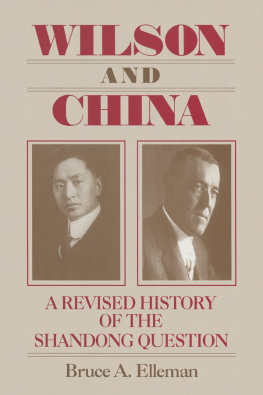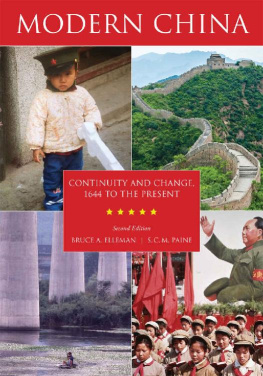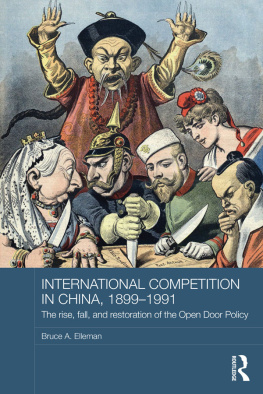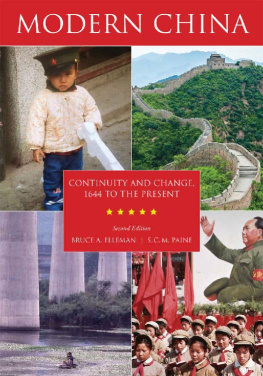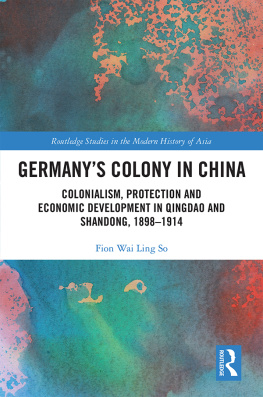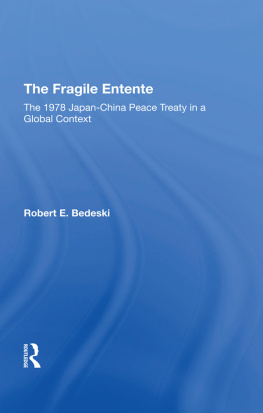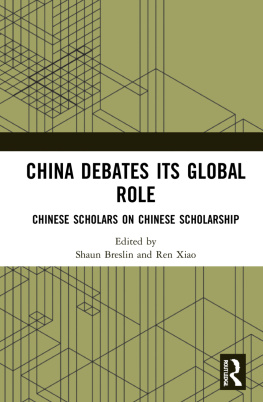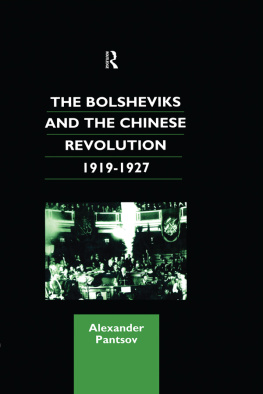WILSON
AND
CHINA
WILSON
AND
CHINA
A REVISED HISTORY
OF THE
SHANDONG QUESTION
Bruce A. Elleman
First published 2002 by M.E. Sharpe
Published 2015 by Routledge
2 Park Square, Milton Park, Abingdon, Oxon OX14 4RN
711 Third Avenue, New York, NY 10017, USA
Routledge is an imprint of the Taylor & Francis Group, an informa business
Copyright 2002 Taylor & Francis. All rights reserved.
No part of this book may be reprinted or reproduced or utilised in any form or by any electronic, mechanical, or other means, now known or hereafter invented, including photocopying and recording, or in any information storage or retrieval system, without permission in writing from the publishers.
Notices
No responsibility is assumed by the publisher for any injury and/or damage to persons or property as a matter of products liability, negligence or otherwise, or from any use of operation of any methods, products, instructions or ideas contained in the material herein.
Practitioners and researchers must always rely on their own experience and knowledge in evaluating and using any information, methods, compounds, or experiments described herein. In using such information or methods they should be mindful of their own safety and the safety of others, including parties for whom they have a professional responsibility.
Product or corporate names may be trademarks or registered trademarks, and are used only for identification and explanation without intent to infringe.
Library of Congress Cataloging-in-Publication Data
Elleman, Bruce A., 1959
Wilson and China : a revised history of the Shandong question / by Bruce A. Elleman.
p. cm.
Includes bibliographical references and index.
ISBN 0-7656-1050-7 (alk. paper) ISBN 0-7656-1051-5 (pbk. : alk. Paper)
1. ChinaForeign relationsJapan. 2. JapanForeign relationsChina.
3. ChinaForeign relations19121949. 4. Shandong Sheng (China)History.
I. Title: Revised history of the Shandong question. II. Title.
DS740.5.J3 E44 2002
327.51052-dc21
2002024699
ISBN 13: 9780765610515 (pbk)
ISBN 13: 9780765610508 (hbk)
To S.C.M. Paine
Contents
This book has been an outgrowth of my first book, entitled Diplomacy and Deception: The Secret History of Sino-Soviet Diplomatic Relations, 19171927 (Armonk, NY: M.E. Sharpe, 1997). I would like to thank in particular Sarah C. M. Paine and our two children, Anna Virginia Elleman and Steven Moyers Elleman. At the U.S. Naval War College, I am grateful for the support of Alberto Coll, Jonathan Pollack, George Baer, Andrew Ross, Peter Dombrowski, Lyle Goldstein, Christopher Bell, John Maurer, Andrew (Dex) Wilson, Steven Kenny, Bill Murray and, of course, Shirley Wilkins and Cheryl Rielly. Special thanks go to Paul As well for his help with the maps. For library assistance above and beyond the call of duty, I would like to thank in particular Alice Juda and Bob Schnare. At International Christian University, I would like to thank Bill Steele, Trish Sippel, and Roger Buckley. At Texas Christian University, I am especially grateful to my first department chairman, Spencer Tucker, and to the many faculty members who helped me with my research and writing, in particular Don Coerver, Don Worcester, Paul Boiler, Gene Smith, Steve Woodworth, and Todd Kerstetter. Noriko Kamachi ceaselessly gave advice on how to rework the manuscript. And, last but not least, a great big thanks to Pat, Irina, and Ana at M.E. Sharpe.
I was fortunate to receive financial assistance from the following organizations: the Committee on Scholarly Communication with the Peoples Republic of China, with support from the United States Department of Education, funded twelve months of research in Beijing and Nanjing in 1990; the Pacific Cultural Foundation funded research in Taipei during ten months in Taiwan during the 199192 academic year; the Hoover Institution on War, Revolution and Peace funded the writing and initial publication of this research during the 199394 academic year under the Discretionary Grant Program, U.S. Department of State, Soviet-Eastern European Research and Training Act of 1983 (Public Law 98164, Title VIII, 97 Stat. 104750), and during the 199495 academic year under the National Fellowship program; and the Institute of Asian Cultural Studies, International Christian University, Mitaka, Japan, provided generous support during my stay as a research fellow in 1998. At Texas Christian University, I received yearly research grants through the auspices of the Research and Creative Activities Fund. At the U.S. Naval War College, I received crucial funding and support through the Strategic Research Department, Center for Naval Warfare Studies.
I would also like to express my gratitude to the librarians and staff at the Academia Sinica and the Guomindang Archives (both in Taipei, Taiwan); the former Lenin Library in Moscow, Russia; the Number Two Historical Archives in Nanjing, Peoples Republic of China; the Foreign Ministry Archives in Tokyo, Japan; the Hoover Institution Archives at Stanford; the Bancroft Library at University of California, Berkeley; the Manuscript Division of the Library of Congress; the Seeley Mudd Archives at Princeton; the Houghton Library at Harvard; and the Rare Book and Manuscript Library at Columbia, all of which so generously shared their extensive collections of documents on foreign relations.
Permission was kindly granted by Asian Cultural Studies, The American Asian Review, and Modern China to reprint material that first appeared in article form. I alone am responsible for the interpretations in this work and for all shortcomings contained therein.
The transliteration system used for Russian is the Library of Congress system minus the diacritical marks. For Chinese, the Pinyin system has been used, except for those names which have entered into common usage by another romanization, for example: Sun Yat-sen, Chiang Kai-shek, etc. Citations in the end notes, however, have retained the original transliterations throughout.
Beijing government refers to the internationally recognized central government in Beijing, while the Guangzhou government refers to Sun Yat-sens opposition government in the southern Chinese city of Guangzhou (Canton). Similarly, the Guomindang refers to Sun Yat-sens political party, also referred to as the Nationalist party. Although located in Beijing, Peking University retains the older spelling. The term Outer Mongolia refers to the northern portion of Greater Mongolia that roughly corresponds to modern-day Mongolia. White Russians refers generally to all Russians who fled to China in the aftermath of the 1917 revolutions, irrespective of whether they supported the Tsarist government, the provisional government, or some other faction. Finally, Soviet Russia is used to refer to the Bolshevik state prior to 1922, while Soviet Union or USSR is used after 1922.
All Chinese personal names are written with surname first, then given name, with the exception of Chinese who adopted Western usage, such as Wellington Koo (Gu Weijun) and C.T. Wang (Wang Zhengting). The Japanese, in line with their adoption of westernized usage at the Paris Peace Conference, are listed in the text with their given name first, followed by their surname. The reverse, however, often appears in footnotes, especially of modern Japanese sources. Underlined and italicized words are as in the original documents.
Next page
